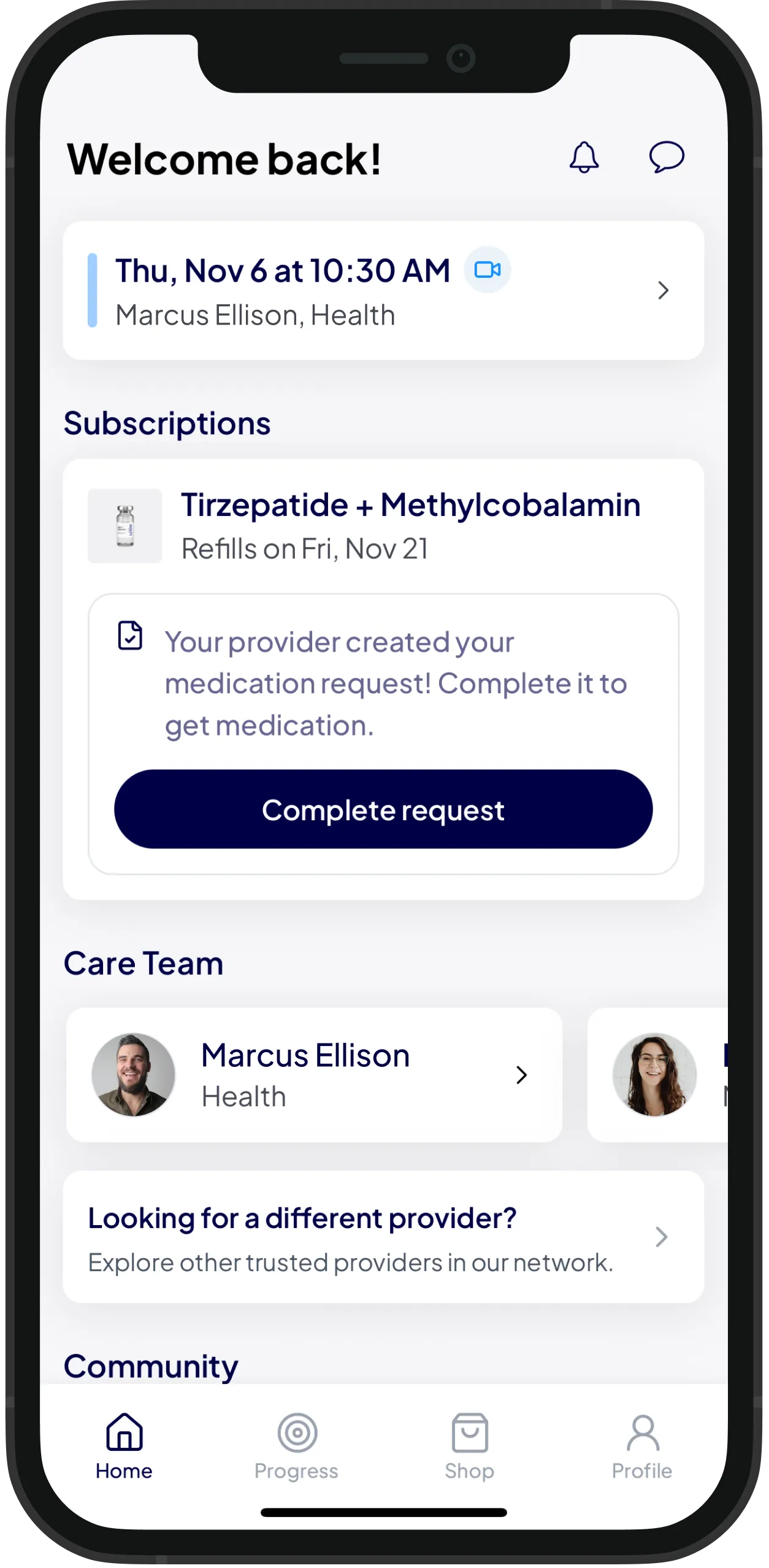Ready to transform your health?
Unlock access to expert guidance and a weight care plan crafted just for you.
Similar Articles
Similar Articles

How to Spot Fake Semaglutide: Safety Risks and Warning Signs
How to Spot Fake Semaglutide: Safety Risks and Warning Signs

Alternatives to BMI: Better Ways to Measure Health
Alternatives to BMI: Better Ways to Measure Health

Is Zofran Safe with Semaglutide? What You Need to Know
Is Zofran Safe with Semaglutide? What You Need to Know
Different Types of Bariatric Surgery
Learn about bariatric surgery, the different types of bariatric surgery, benefits and the different ways to do each bariatric surgery procedure in this page.

Table of Contents
Table of Contents
What is Bariatric Surgery?
What Are the Most Common Types of Bariatric Surgery?
What Are the Different Ways to Do Each Procedure?
What are the Benefits of Different Types of Bariatric Surgery Treatments?
What is Bariatric Surgery?
What Are the Most Common Types of Bariatric Surgery?
What Are the Different Ways to Do Each Procedure?
What are the Benefits of Different Types of Bariatric Surgery Treatments?
When it comes to the weight loss journey, obese people now have different options to avail for losing unwanted body fat from almost any body part. Known as bariatric surgery, weight loss treatments are minimally invasive but effective and equally safe methods of weight loss.
What is Bariatric Surgery?
Bariatric surgery is more commonly known as weight loss surgery. It helps you to lose weight by making your stomach smaller. When your stomach is smaller, you are not able to eat as much food as before because you feel full more quickly with smaller amounts of food.
What Are the Most Common Types of Bariatric Surgery?
Gastric Sleeve: This operation helps you to lose weight in two different ways. A portion of the stomach is removed, making the amount of food your stomach can fit smaller. Additionally, it removes a part of the stomach that secretes hormones that signal your body that you are hungry. This operation is usually done laparoscopically, but can also be done endoscopically or by an “open” procedure (see more about different ways to do each procedure below). This is a permanent procedure.


Gastric Banding: This operation puts a band all around the upper part of the stomach. What this does is make the upper stomach smaller, which makes you feel full for longer periods of time. This band has a connection to the outside of your body, so you can adjust how constricted the upper part of your stomach is after the band is placed. This is a temporary intervention, meaning you can not have it in place your whole life. This procedure is done laparoscopically.

Intragastric ballooning: This operation also works by decreasing the size of the stomach. A small balloon full of saline (salt water) is placed in the stomach to take up space, making you feel full with smaller amounts of food. This is a temporary intervention, meaning you can not have it in place your whole life. This procedure is done endoscopically.
What Are the Different Ways to Do Each Procedure?
Laparoscopically: this means that small holes are made in your abdominal wall to put a camera and other tools through. Procedures done this way are less invasive and usually do not require as long of recovery times as open procedures. You will typically have 3-5 small cuts in your abdominal wall that will need to heal.
Endoscopically: operations are done endoscopically using a camera that is put down your throat and brought into your stomach. Other tools can be brought into your stomach in the same way. Typically, doctors do not have to make any cuts in your skin, so you will not have any incisions that need to heal after the procedure. You may have some throat irritation after.
Open: an open procedure is when you make a larger incision in the abdominal wall to be able to see the parts of the stomach that you need to see with your naked eye rather than a camera. This typically means larger incisions in the abdominal wall that will take longer to heal.
What are the Benefits of Different Types of Bariatric Surgery Treatments?
Severe and morbid obesity is a serious health condition affecting people's lifestyles. Obese individuals are at far greater risk of dying from obesity-related diseases, including
Coronary artery disease
Hypertension (high blood pressure)
Type 2 diabetes
Certain cancers.
The combination of bariatric surgery with an effective treatment plan can help obese individuals with the following:
Improved longevity
After undergoing bariatric surgery, obese people can improve their health and improve their life longevity.
Improvement or cure of obesity-related conditions. Most patients who have bariatric surgery have an improvement or cure for obesity-related conditions, including high blood pressure, diabetes, sleep apnea, asthma, arthritis, cholesterol levels, and more.
Faster metabolism. As you lose more weight, you will find yourself participating in more physical activity, such as biking, walking, and swimming, which improves the body's ability to burn fat efficiently. Hormones like insulin and cortisol (stress hormone) are also reduced, which helps lower the body's storage of fat.
Better quality of life. Bariatric surgery patients report better quality of life after the procedure, including better mobility, reduced depression and anxiety, improved self-esteem, social interactions, and sexual function.
When it comes to the weight loss journey, obese people now have different options to avail for losing unwanted body fat from almost any body part. Known as bariatric surgery, weight loss treatments are minimally invasive but effective and equally safe methods of weight loss.
What is Bariatric Surgery?
Bariatric surgery is more commonly known as weight loss surgery. It helps you to lose weight by making your stomach smaller. When your stomach is smaller, you are not able to eat as much food as before because you feel full more quickly with smaller amounts of food.
What Are the Most Common Types of Bariatric Surgery?
Gastric Sleeve: This operation helps you to lose weight in two different ways. A portion of the stomach is removed, making the amount of food your stomach can fit smaller. Additionally, it removes a part of the stomach that secretes hormones that signal your body that you are hungry. This operation is usually done laparoscopically, but can also be done endoscopically or by an “open” procedure (see more about different ways to do each procedure below). This is a permanent procedure.


Gastric Banding: This operation puts a band all around the upper part of the stomach. What this does is make the upper stomach smaller, which makes you feel full for longer periods of time. This band has a connection to the outside of your body, so you can adjust how constricted the upper part of your stomach is after the band is placed. This is a temporary intervention, meaning you can not have it in place your whole life. This procedure is done laparoscopically.

Intragastric ballooning: This operation also works by decreasing the size of the stomach. A small balloon full of saline (salt water) is placed in the stomach to take up space, making you feel full with smaller amounts of food. This is a temporary intervention, meaning you can not have it in place your whole life. This procedure is done endoscopically.
What Are the Different Ways to Do Each Procedure?
Laparoscopically: this means that small holes are made in your abdominal wall to put a camera and other tools through. Procedures done this way are less invasive and usually do not require as long of recovery times as open procedures. You will typically have 3-5 small cuts in your abdominal wall that will need to heal.
Endoscopically: operations are done endoscopically using a camera that is put down your throat and brought into your stomach. Other tools can be brought into your stomach in the same way. Typically, doctors do not have to make any cuts in your skin, so you will not have any incisions that need to heal after the procedure. You may have some throat irritation after.
Open: an open procedure is when you make a larger incision in the abdominal wall to be able to see the parts of the stomach that you need to see with your naked eye rather than a camera. This typically means larger incisions in the abdominal wall that will take longer to heal.
What are the Benefits of Different Types of Bariatric Surgery Treatments?
Severe and morbid obesity is a serious health condition affecting people's lifestyles. Obese individuals are at far greater risk of dying from obesity-related diseases, including
Coronary artery disease
Hypertension (high blood pressure)
Type 2 diabetes
Certain cancers.
The combination of bariatric surgery with an effective treatment plan can help obese individuals with the following:
Improved longevity
After undergoing bariatric surgery, obese people can improve their health and improve their life longevity.
Improvement or cure of obesity-related conditions. Most patients who have bariatric surgery have an improvement or cure for obesity-related conditions, including high blood pressure, diabetes, sleep apnea, asthma, arthritis, cholesterol levels, and more.
Faster metabolism. As you lose more weight, you will find yourself participating in more physical activity, such as biking, walking, and swimming, which improves the body's ability to burn fat efficiently. Hormones like insulin and cortisol (stress hormone) are also reduced, which helps lower the body's storage of fat.
Better quality of life. Bariatric surgery patients report better quality of life after the procedure, including better mobility, reduced depression and anxiety, improved self-esteem, social interactions, and sexual function.
Read next
Ready to transform your health?
Unlock access to expert guidance and a weight care plan crafted just for you.

Ready to transform your health?
Unlock access to expert guidance and a weight care plan crafted just for you.

Ready to transform your health?
Unlock access to expert guidance and a weight care plan crafted just for you.


© 2026 Mochi Health
All professional medical services are provided by licensed physicians and clinicians affiliated with independently owned and operated professional practices. Mochi Health Corp. provides administrative and technology services to affiliated medical practices it supports, and does not provide any professional medical services itself.


© 2026 Mochi Health
All professional medical services are provided by licensed physicians and clinicians affiliated with independently owned and operated professional practices. Mochi Health Corp. provides administrative and technology services to affiliated medical practices it supports, and does not provide any professional medical services itself.


© 2026 Mochi Health
All professional medical services are provided by licensed physicians and clinicians affiliated with independently owned and operated professional practices. Mochi Health Corp. provides administrative and technology services to affiliated medical practices it supports, and does not provide any professional medical services itself.


















